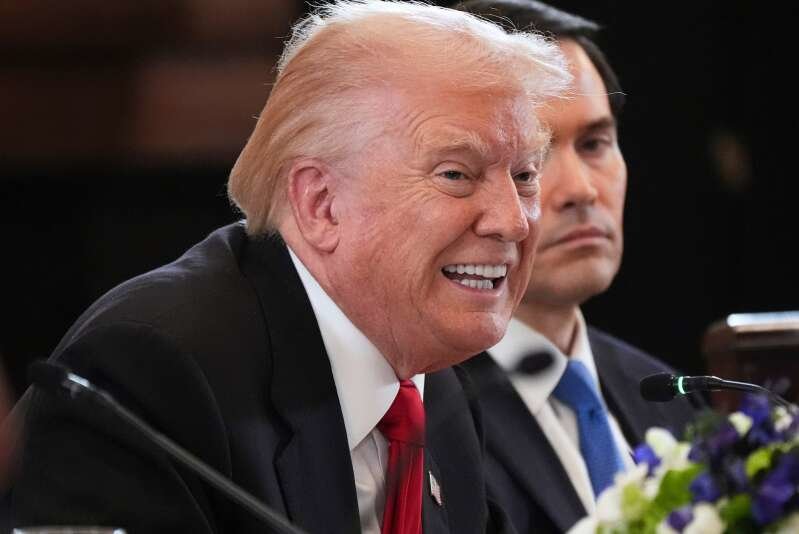
Trump Proposes Redirecting ACA Subsidies Amid Government Shutdown Standoff
President urges Senate Republicans to shift Affordable Care Act funds from insurers to individuals as funding impasse continues
President Donald Trump has called on Senate Republicans to redirect funding from the Affordable Care Act (ACA) subsidies currently flowing to health insurance companies and instead send it directly to average Americans.
He made the appeal on Saturday as the federal government remains shut down, with the Senate gridlocked over both government funding and health-care policy.
The ACA subsidies in question, originally strengthened in 2021, are set to expire at the end of the year and millions of Americans rely on them to buy insurance plans through the federal marketplace.
The president wrote in a post on his social-media platform: “I am recommending to Senate Republicans that the hundreds of billions of dollars currently being sent to money-sucking insurance companies … be sent directly to the people so that they can purchase their own, much better, healthcare, and have money left over.”
The Senate remains in stasis.
Republicans rejected a Democratic proposal to pair a one-year extension of the subsidies with reopening the government, saying health-care policy must follow first.
Senate Majority Leader John Thune said that any action on health care costs including the president’s proposal will have to wait until the government is funded.
The government shutdown has triggered wide-ranging disruptions: air-traffic delays, interruption to benefits programmes and furloughs affecting roughly six-hundred-fifty-thousand federal workers.
Senate Minority Leader Charles E. Schumer questioned the administration’s motives and said the cuts to aviation operations were being used as leverage.
Trump’s proposal received support from certain Republican senators, including Bill Cassidy and Rick Scott, who are moving ahead with legislation inspired by the president’s suggestion.
But health-policy experts and Democratic lawmakers warned the idea is unworkable, saying that redirecting subsidy funds would require new legislation, risk destabilising insurance markets and that the broader premium-tax-credit regime is not yet ready for such a change.
Under the current framework, around twenty-four million Americans receive coverage through marketplace plans and many rely on the enhanced subsidies whose expiration could cause significant premium increases.
With rising urgency, bipartisan negotiators in the House have proposed extending the subsidies for two years under conditions including income caps and fraud prevention, but Republican leadership in the Senate says health policy should not be tied to the funding bill.
As the standoff continues, the White House insists that no negotiations will occur until the government reopens, while Democrats maintain that extending the subsidies must be part of any funding deal.
For now, millions of Americans remain in uncertainty over their health insurance coverage and benefits, while Washington remains gridlocked.
He made the appeal on Saturday as the federal government remains shut down, with the Senate gridlocked over both government funding and health-care policy.
The ACA subsidies in question, originally strengthened in 2021, are set to expire at the end of the year and millions of Americans rely on them to buy insurance plans through the federal marketplace.
The president wrote in a post on his social-media platform: “I am recommending to Senate Republicans that the hundreds of billions of dollars currently being sent to money-sucking insurance companies … be sent directly to the people so that they can purchase their own, much better, healthcare, and have money left over.”
The Senate remains in stasis.
Republicans rejected a Democratic proposal to pair a one-year extension of the subsidies with reopening the government, saying health-care policy must follow first.
Senate Majority Leader John Thune said that any action on health care costs including the president’s proposal will have to wait until the government is funded.
The government shutdown has triggered wide-ranging disruptions: air-traffic delays, interruption to benefits programmes and furloughs affecting roughly six-hundred-fifty-thousand federal workers.
Senate Minority Leader Charles E. Schumer questioned the administration’s motives and said the cuts to aviation operations were being used as leverage.
Trump’s proposal received support from certain Republican senators, including Bill Cassidy and Rick Scott, who are moving ahead with legislation inspired by the president’s suggestion.
But health-policy experts and Democratic lawmakers warned the idea is unworkable, saying that redirecting subsidy funds would require new legislation, risk destabilising insurance markets and that the broader premium-tax-credit regime is not yet ready for such a change.
Under the current framework, around twenty-four million Americans receive coverage through marketplace plans and many rely on the enhanced subsidies whose expiration could cause significant premium increases.
With rising urgency, bipartisan negotiators in the House have proposed extending the subsidies for two years under conditions including income caps and fraud prevention, but Republican leadership in the Senate says health policy should not be tied to the funding bill.
As the standoff continues, the White House insists that no negotiations will occur until the government reopens, while Democrats maintain that extending the subsidies must be part of any funding deal.
For now, millions of Americans remain in uncertainty over their health insurance coverage and benefits, while Washington remains gridlocked.












